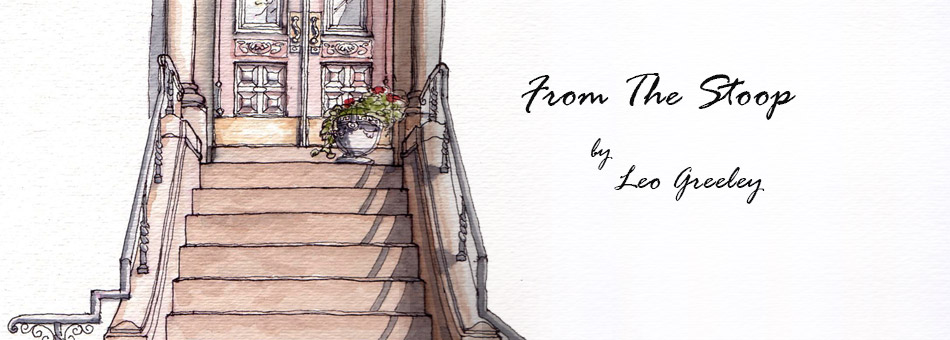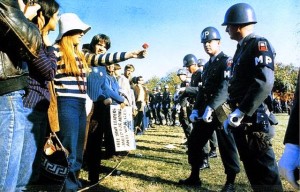From the Stoop – May 2015
It turns out the ability to choose the stoop and the time spent on it is a good thing. Spring has finally arrived and the warm sun is a welcomed feeling as I have my morning coffee. I have the pleasure of watching the younger children wait for their buses or if they go to the school behind our house I watch them stall and seemingly do everything but follow a straight-line between home and school. The children who pass by on the way to high school or junior high seem to walk either in pairs or alone and mostly all are plugged in to some device or other. I can only assume they are listening to their choice of music. Seeing the expressionless faces with headphones makes me think, oddly enough, of REVOLUTION.
There was a time not that long ago where the release of a new album required restraint to not listen to the music before your friends could gather with you and listen in order of recording and discuss the intent and the message of the artist. The 1960s and part of the 1970s was when music was the vessel where the message of social change was carried. The music was a reason to gather, to socialize and to effect change. Artists knew their responsibility in the direction or social change and the followers adopted the path whole heartedly. It was an accident that worked perfectly. At least at the start.
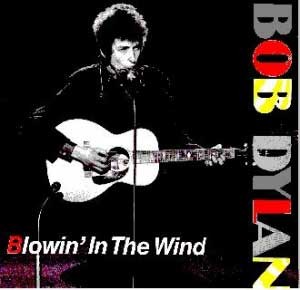
There has never been a time in history where so many seeds of change were planted in such a short period of time. Feminism, civil rights, equality and ownership of ones future were all ideologies being brought to the forefront with staggering speed.
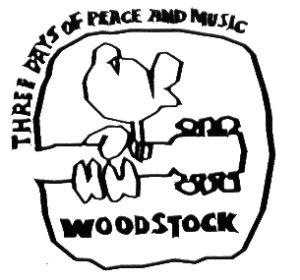
Admittedly Canada along with other countries followed and supported the movement in the United States towards a cessation of war and a brotherhood of man. It didn’t stop there however. Music became a space for cultural and political conflict and dialog. It transcended the borders separating countries and gave a common voice to a dissatisfied youth.
Any observer could track the changes in musical attitude by looking at how some artists were transformed during the war years. Bobby Darin began his pop career as a teen idol in 1958 with the million-seller “Splish Splash,” an imitation of Jerry Lee Lewis. By 1969 Darin, in a leather jacket with buckskin fringe, was writing songs of political activism and denouncing the war in his “Simple Song of Freedom.” Dion Di Mucci (Dion) followed a similar trajectory. In 1960 he had his first hit with “Lonely Teenager,” about young love gone astray. But in 1968, after eighteen follow-up hits about the same subject, Dion offered a song-survey of domestic and international violence in “Abraham, Martin, and John.”
Even in spite of the demand by the music industry’s concern for a song’s chart location each week, and the fear of upsetting large distributors, made radical anti-war statements in popular music a relatively rare occurrence. Songs by popular musicians were written for the radio and often with a popular audience in mind. This growing and eventually gargantuan record business had its demands. An artist with enough clout or record sales could occasionally get out a song with a political or social message. For example, Creedence Clearwater Revival’s “Fortunate Son,” a caustic attack on militarism and the class- and race-based unfairness of the draft, was released and sold well.
“Fortunate Son,” written in 1969 by Creedence lead singer John Fogerty, was an uncompromising two-minute-and-twenty-one-second manifesto about how those with connections and money avoided the draft while the poor and working class had to go to war.
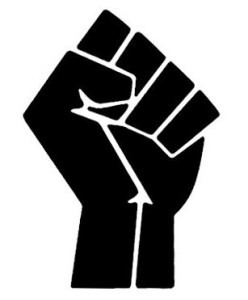
In the mid-60s the Civil Rights and The Civil Rights Act of 1964 were important political issues, and the Black Power movement also arose. By 1963, Bob Dylan and Joan Baez were both notable in the civil rights movement. Many of Dylan’s songs, such as “Blowin’ in the Wind” and “The Times They Are a-Changin’“, became anthems of the anti-war and civil rights movements. Second wave feminism owes it voice to the revolution of music in the 1960s. This revivalist movement focused on what it saw as a multitude of inequalities and oppressions suffered by women at the hands either of individual men or ‘the patriarchy’ but more so by society in general. The slogan ‘the personal is political’ typified this view of every aspect of a woman’s life being subject to some kind of oppression by men. This movement has campaigned on a huge number of issues, including abortion, sexuality, and special rights for women. Example is in Aretha Franklin’s trademark hit from her 1967 breakthrough album I Never Loved a Man the Way I Love You. It was originally written and recorded by Otis Redding in 1965 but with a few modifications, Aretha transformed the song into an anthem of female empowerment. The song became an important catalyst for the feminist movement of the 70s. It is definitely one of the catchiest and most infectious protest songs ever recorded: R-E-S-P-E-C-T, “All I’m asking for is a little respect when I come home.”
The Black Panthers, as conceived by Newton and Seale, called for the immediate end of police harassment and brutality in African American neighborhoods and ghettos. They issued a ten-point program that called for armed protection against police oppression, and other radical changes in America’s capitalist system. At the same time, they began a breakfast program for children, a food bank, and other social services to empower the poorest lower-class residents of Oakland. The Black Panthers were supported wholeheartedly by the music industry. High profile musicians like Marvin Gaye, James Brown, Curtis Mayfield, Gil Scott Heron and the Last Poets all wrote songs and music around some of the key messages of the movement. Soul and funk was the style of the black awakening and even instrumental music carried the message to black Americans. Writer and lecturer Rickey Vincent comments, “What was happening was that people were growing—they were changing. You could hear it on the radio because the radio was an independent black cultural production… You had a whole lot of music that celebrated that defiant energy and it even came from Mowtown. Sam and Dave’s Soul Man speaks to the identity that black Americans were developing in 1967 and ’68.”
A very important seed was planted in 1969 and has been kept alive by the lasting power of it’s music. It is dire time for the fruit of that seed to be harvested and bring the focus of youth back to their planet. I am afraid however that the corporation of music as it is today is more of an establishment than the bureaucracy that inspired protest. Music in 2015 is all about the bottom line, the size of the venue and the shock power of the lyrics. Black music is more about glorifying life on the streets in the most vulgar terms than it is about pride and change. The appeal of a female performer is in the sexuality of her dance and the quantity of supporting dancers. A step backwards perhaps. Media has been given the green light to inundate our senses with shock news. And no one protests global issues in verse.

Our youth have been given a mandate to be connected, to accept decisions about their future long before they are due and to give up their creativity because media says there is danger out there. Play XBox instead of building a fort or a soapbox car because you need to supervise and your “supervisor” is too busy being connected. Encourage youth to take back their childhood and if they say “NO” ask them why and listen to the answers because they are the ones who will inherit the wireless mess we are giving them. We do not need to take them by the hand and say we need a well here or a goat there because they already know and quietly question why there isn’t already a well there giving water to the goats that were promised over and over again. Respect their souls and they will astonish you.
My granddaughter Elyse reminded me on a warm summer day last year how important it was to run out into the rain, barefoot, when everyone else was running in so that we could dance. Her lesson gave me hope for a planet that seems to be in turmoil and begging for a quiet summer rain with her inhabitants dancing with flowers in their hair.

